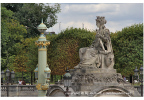Другие журналы
scientific edition of Bauman MSTU
SCIENCE & EDUCATION
Bauman Moscow State Technical University. El № FS 77 - 48211. ISSN 1994-0408
JAPAN: Slow transparency of universities
18.09.2011
 Since April this year, universities and colleges in Japan have been required by law to disclose information about their facilities, employees and subjects taught. Even though the Ministry of Education, Culture, Sports, Science and Technology (MEXT) has asked only for the bare minimum of information — such as number of professors and instructors, tuition and school fees, and a basic outline of facilities — many universities are still reluctant to expose themselves.
Since April this year, universities and colleges in Japan have been required by law to disclose information about their facilities, employees and subjects taught. Even though the Ministry of Education, Culture, Sports, Science and Technology (MEXT) has asked only for the bare minimum of information — such as number of professors and instructors, tuition and school fees, and a basic outline of facilities — many universities are still reluctant to expose themselves.Deciding on a college or university is one of the most important decisions in a student's, and a family's, life. In Japan, universities and colleges have been exempt from such disclosure until this year, and even now, the information they are required to disclose is only minimal.
The curriculum, research accomplishments, methods of teaching, course offerings, facilities and other elements of a good university education need to be detailed and disclosed.
Universities and colleges have for too long hidden behind a cloak of secrecy. The respect for and trust in education are positive values, but not when they are built on hidden data.
In other areas of life, all relevant data for consumer purchases must be provided. The disclosure of technical specifications on automobiles and listing of ingredients in food products, for example, are mandated by law. The same should apply to universities.
Most institutions, no doubt, want to protect their reputation, and some fear they cannot compete if all information is disclosed. However, the public's right to know everything before spending a large sum of money on education at college or university is more important.
Rather than advertising through repute and status, providing accurate information about what goes on in classes, and how students are expected to develop, is a more substantial method of attracting students.
Transparency and openness are also important for the schools. Presenting an accurate picture of the current conditions of the school will motivate the institutions to keep examining their curriculum, teaching methods and organization. Secrecy allows problems to fester behind closed doors.
All institutions should make it a point of pride to show what they are doing right and be unafraid to acknowledge weaker points needing improvement.
All Japanese universities and colleges need to provide parents and prospective students with everything needed to make informed decisions. An open appraisal of relevant, meaningful data, followed by a critical examination, is what all prospective students deserve.
Universities should be examples of what, after all, they should be teaching — how to evaluate information and make difficult, reasoned decisions.
Source: The Japan Times
Photo: Tokyo University
| Authors |
| Press-releases |
| Library |
| Conferences |
| About Project |
| Phone: +7 (915) 336-07-65 (строго: среда; пятница c 11-00 до 17-00) |
|
||||
| © 2003-2024 «Наука и образование» Перепечатка материалов журнала без согласования с редакцией запрещена Phone: +7 (915) 336-07-65 (строго: среда; пятница c 11-00 до 17-00) | |||||



